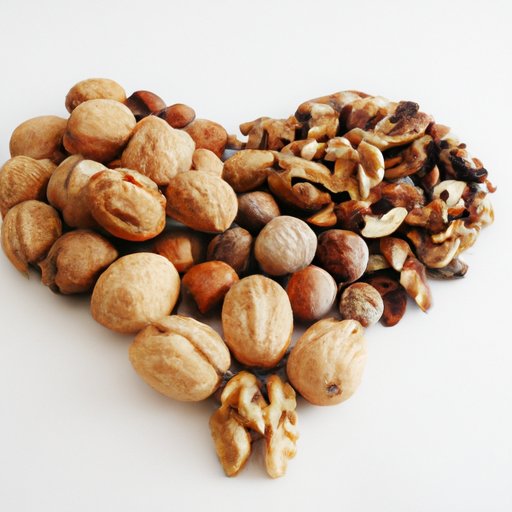
I. Introduction
Heart disease is one of the leading causes of death worldwide, but it is also largely preventable. Making simple changes to your diet and lifestyle can significantly reduce your risk of developing heart disease. In this article, we’ll explore some of the most effective foods and diets for preventing heart disease.
II. Top 10 Foods for a Heart-Healthy Diet
There are many foods that can help promote heart health, but here are 10 of the best:
1. Fatty fish: Salmon, tuna, and other fatty fish are high in omega-3 fatty acids, which can help lower blood pressure and reduce the risk of heart disease.
2. Berries: Blueberries, strawberries, and other berries are rich in antioxidants, which can help protect the heart from damage.
3. Leafy greens: Spinach, kale, and other leafy greens are rich in vitamins, minerals, and antioxidants that can support heart health.
4. Whole grains: Whole grains like oats, brown rice, and quinoa are high in fiber and can help lower cholesterol levels.
5. Avocado: Avocado is high in heart-healthy fats, fiber, and potassium, which can all help promote heart health.
6. Tomatoes: Tomatoes are high in lycopene, an antioxidant that can help prevent heart disease.
7. Nuts: Nuts like almonds, walnuts, and pistachios are high in healthy fats, protein, and fiber, which can all help support heart health.
8. Legumes: Beans, lentils, and chickpeas are high in fiber, protein, and other nutrients that can help lower cholesterol and promote heart health.
9. Dark chocolate: Dark chocolate is high in flavonoids, which can help lower blood pressure and reduce the risk of heart disease.
10. Green tea: Green tea is high in antioxidants called catechins, which can help improve blood flow and reduce the risk of heart disease.
To incorporate these foods into your diet, try adding berries to your morning oatmeal, snacking on nuts throughout the day, or adding leafy greens to your lunchtime salad.
III. Focus on a Particular Type of Food: Nuts
Nuts are particularly effective in preventing heart disease because they are high in healthy fats, fiber, and protein. Some studies have even found that eating nuts regularly can help lower cholesterol levels and reduce the risk of heart disease.
To incorporate nuts into your diet, try spreading nut butter on toast for breakfast, adding a handful of nuts to your afternoon snack, or making a mixed nut salad for dinner.
IV. Role of Antioxidants in Heart Health
Antioxidants are compounds that can help protect the body from damage caused by free radicals. Free radicals can damage cells and contribute to the development of heart disease.
Some of the top antioxidant-rich foods include berries, dark chocolate, and green tea. To incorporate these foods into your diet, try making a berry smoothie for breakfast, snacking on dark chocolate in the afternoon, or enjoying a cup of green tea after dinner.
V. Mediterranean Diet and Heart Health
The Mediterranean diet is a heart-healthy eating plan that is based on the traditional cuisine of countries like Greece and Italy. This diet is rich in fruits, vegetables, whole grains, and healthy fats like olive oil and nuts.
Research has shown that following a Mediterranean diet can help lower the risk of heart disease and improve overall heart health. Some examples of Mediterranean-inspired meals include a Greek salad with feta cheese, roasted salmon with olive oil and lemon, or a chickpea and vegetable stew.
VI. Role of Lifestyle Factors in Heart Health
In addition to diet, lifestyle factors like stress and lack of sleep can also impact heart health. Fortunately, there are certain foods that can help combat these negative effects.
Leafy greens like spinach and kale are rich in magnesium, which can help reduce stress levels. Chamomile tea is also a great way to promote relaxation and reduce stress. Other foods like oatmeal and turkey contain tryptophan, an amino acid that can help improve sleep quality.
VII. Conclusion
By incorporating these heart-healthy foods and diets into your routine, you can significantly reduce your risk of developing heart disease. Whether you add nuts to your snack lineup or switch to a Mediterranean-inspired diet, small changes can make a big difference when it comes to your heart health.




